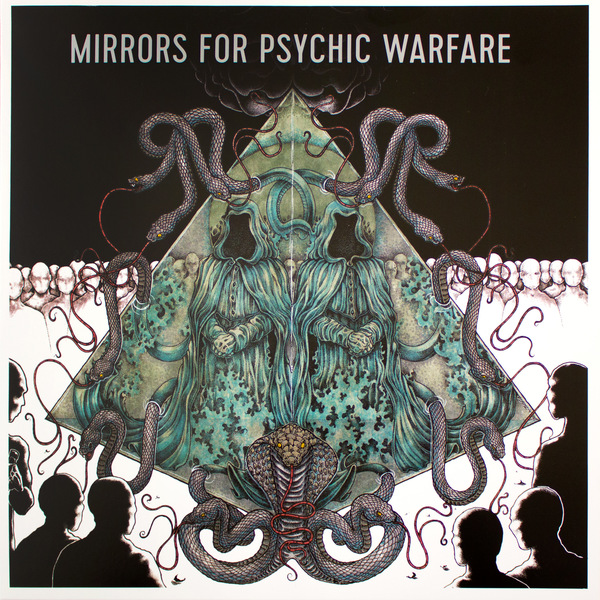Experiments by their very nature are bound to be riddled with failure. This is why they’re great. Sometimes it’s worth watching one of your favourite artists fail to deliver a strong work if it means they’re breaking ground for better, newer things to come. The excellently-named Mirrors For Psychic Warfare is yet another constellation in the galaxy of Neurosis side-projects, and though they couldn’t be called experimental music in the idiomatic sense, their self-titled debut is littered with the middling returns – the glorious highs and stagnant lows – of an experimental approach.
Like the epic sludge of A Storm Of Light or the cosmic folk of Steve Von Till’s Harvestman alias, Scott Kelly and Buried At Sea’s Sanford Parker’s work on this album sees them stretching a fair way beyond the sonic styles of their respective outfits, creating their own unified aesthetic that can be both chillingly exhilarating and mind-numbingly repetitive.
An aesthetic of dank, sonic claustrophobia is established at the outset and maintained through the course of the album. On opener ‘Oracles Hex’, for example, the tortured guitar groans that hover in the background sound as if they’ve been submerged in a vat of crude oil, then buried underground for half a year before being committed to tape. Likewise, the guitars that flicker around the field of hearing on ‘I’ll Try You All’ sound like they’re pinging around the walls of a prison cell. When this oppressive style works, it’s really great – the sickening soundscape of ‘CNN WTZ’ being a case in point. A skull-splitting doom riff sets the pace, whilst wretched vocals ghost the production in a way that is very similar to the vocal work on Sunn O)))’s Black One. Things get more interesting, however, when Mirrors dispense with the riff altogether, landing stolidly on one hulking drone note as the whole thing degenerates into a mess of hotwired electronics that would make Dominic Fenrow jealous.
The aforementioned ‘Oracles Hex’ is another prime example of this style at its most successful. Released as a single over a year ago, it’s a masterful exposition in delay and release, the song miring itself in a sickly aura of guitar and vocals for well over half the track, gradually accumulating layers of sonic filth before a clattering surge of electronic percussion lurches the piece forward. It’s a far more successful take on the electronic/doom hybrids of recent years, trumping The Body’s lumpen collaboration with The Haxan Cloak and Dylan Carlson’s slightly underwhelming sides with The Bug by a country mile.
Yet like all experimental works, there are plenty of moments of stagnation to level out the thrills. ‘Oracles Hex’ is followed by the unnecessarily long ‘A Thorn To See’, a fifteen-minute trudge through portentous bass weight and Kelly’s cosmic lyrics that comes off like a drawn out take on the preceding track. Similarly, the dark atmospherics and pained howls of ‘I’ll Try You All’ are altogether too sonically reminiscent of the preceding track ‘CNN WTZ’ for any of their impact to hit home. Closer ‘43’ is perhaps the album’s weakest track. Opening with a murky synth line that brings to mind John Carpenter, it explodes into an absurd mess of synth brass – probably the lamest sound in electronic music. Just because Liturgy used it on their last album, doesn’t make it OK.
However, it may perhaps be churlish to gripe at such stabs at innovation. On the whole, the propulsive heaviness and thrilling revulsion inspired by tracks like ‘Oracles Hex’ make up for the awkward juxtapositions of tracks ‘43’. At their best, Mirrors For Psychic Warfare are capable of unleashing a gut-churning scree, for which I’m more than happy to sit through a few tracks where they look for that sweet spot.


